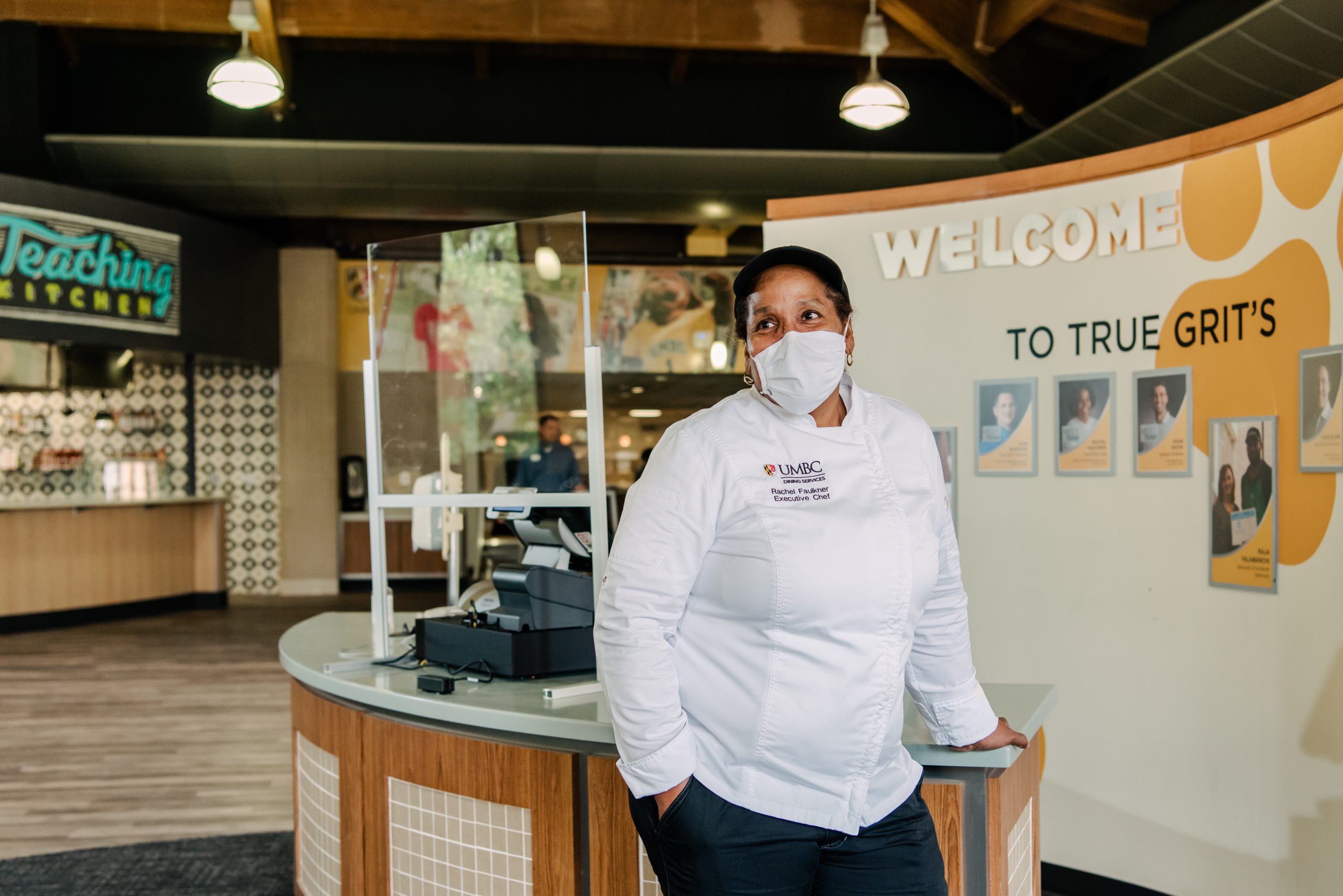While the pandemic required most of our community to adjust to virtual life constrained at home, other Retrievers worked tirelessly on campus to keep UMBC running. For those operating in-person, enduring the heavy silence that blanketed campus, adhering to intense health precautions, and yearning for the people that would once again make UMBC a home characterized their experiences. As many of us now return to the office, we recognize the folks who kept our campus clean, safe, and beautiful—especially those who supported our students along the way. Call them behind-the-scenes allstars, vital resources, boots-on-the-ground—the sustainers—and you’d be right to do so. Here are some of their stories.
Creating Safe Spaces
Name: Tyler Fultz
Title: Acting Manager for Residential Conduct and Community Wellbeing
Location: Residential Life
Tyler Fultz, acting manager for residential conduct and community wellbeing at UMBC, remembers looking out of their on-campus apartment window in spring 2020 and being struck by how silent and empty the campus was. “People just left everything and went home,” Fultz says, still processing how quickly their job changed.
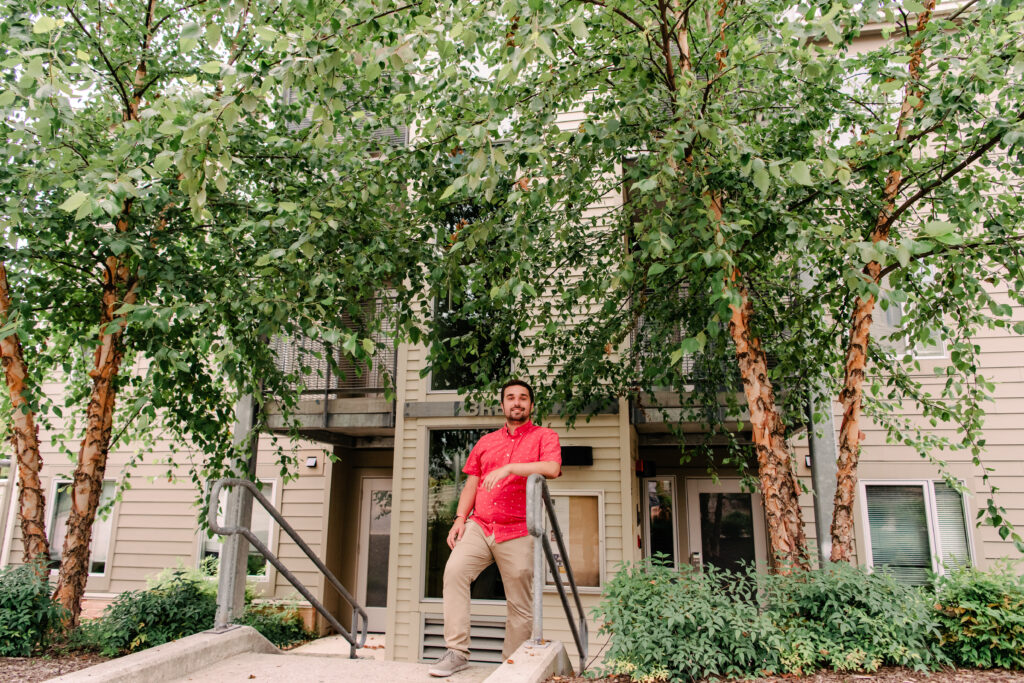
Before March 2020, Fultz supervised a bustling staff of 12 resident assistants, providing support to their team as well as the nearly 800 students living in the West Hill, Terrace, and Hillside apartments on campus. Fultz had a full schedule that also included meeting with students for alleged policy violations, attending student conduct hearings, and serving on a duty rotation to provide support to students 24 hours a day.
During the pandemic, the numbers of residential students in Fultz’s area fell to nearly 200, with only approximately 1,200 residential students total. Fultz shifted to a role overseeing quarantine and isolation housing set up to support students who had tested positive for COVID-19 or were awaiting test results. The landscape felt completely different.
“On one hand, it could feel lonely, but on the other hand it felt like the safest place I could possibly be,” Fultz says about their life on campus during COVID-19. “There were seven community directors who were around campus, but you didn’t run into them.”
Fultz found that building relationships with students became more challenging in the virtual environment because students were burnt out from being on their computers so much. Fultz often first connected with students, who needed housing and support, via phone to talk about the details and answer any questions. From there, they helped facilitate students’ moves into empty on-campus apartments that had university-provided furniture.
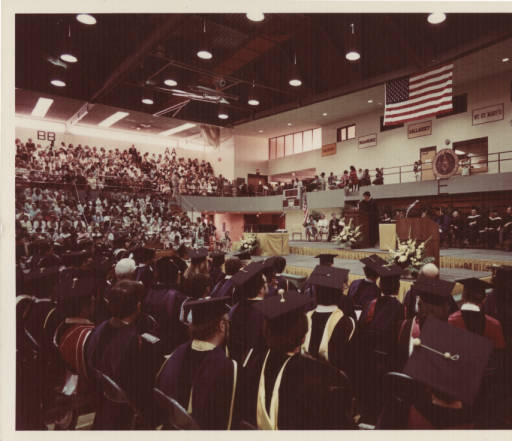
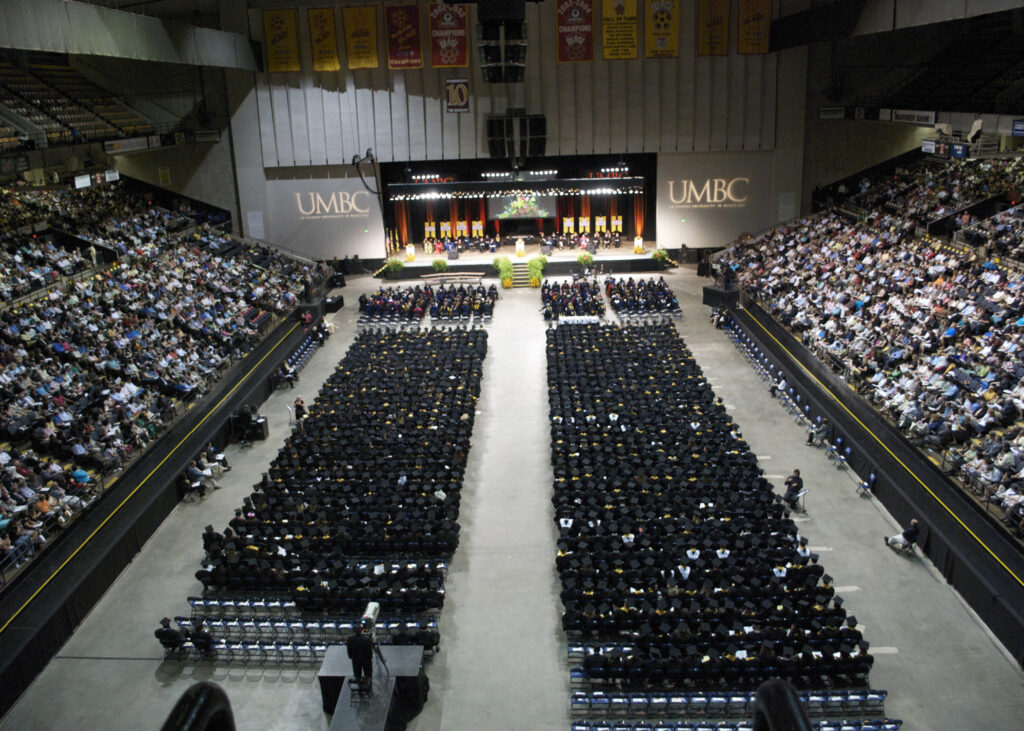
Once a student was in quarantine and isolation housing, Fultz says they let students know they were available in case they needed assistance, or just someone to chat with. “It was a team of people providing support,” Fultz emphasizes, noting no one could have taken on this task alone.
– Megan Hanks Mastrola
Cooking from Scratch in a Pandemic
Name: Rachel Faulkner
Title: True Grit’s Executive Chef
Location: True Grit’s
Rachel Faulkner is used to preparing food for about 2,500 people a day, in addition to managing a staff of nearly 40 people. She oversees the daily menus that are offered at True Grit’s—all made from scratch, including the tomato and alfredo sauces at the pasta station. During the pandemic, however, Faulkner and her limited staff were only feeding about 300 – 600 people each day. She says that even though they were preparing fewer meals, it was still the same amount of work for about one third of the staff. “Everyone who showed up really came in full force,” says True Grit’s executive chef, who came to campus every day during the pandemic.
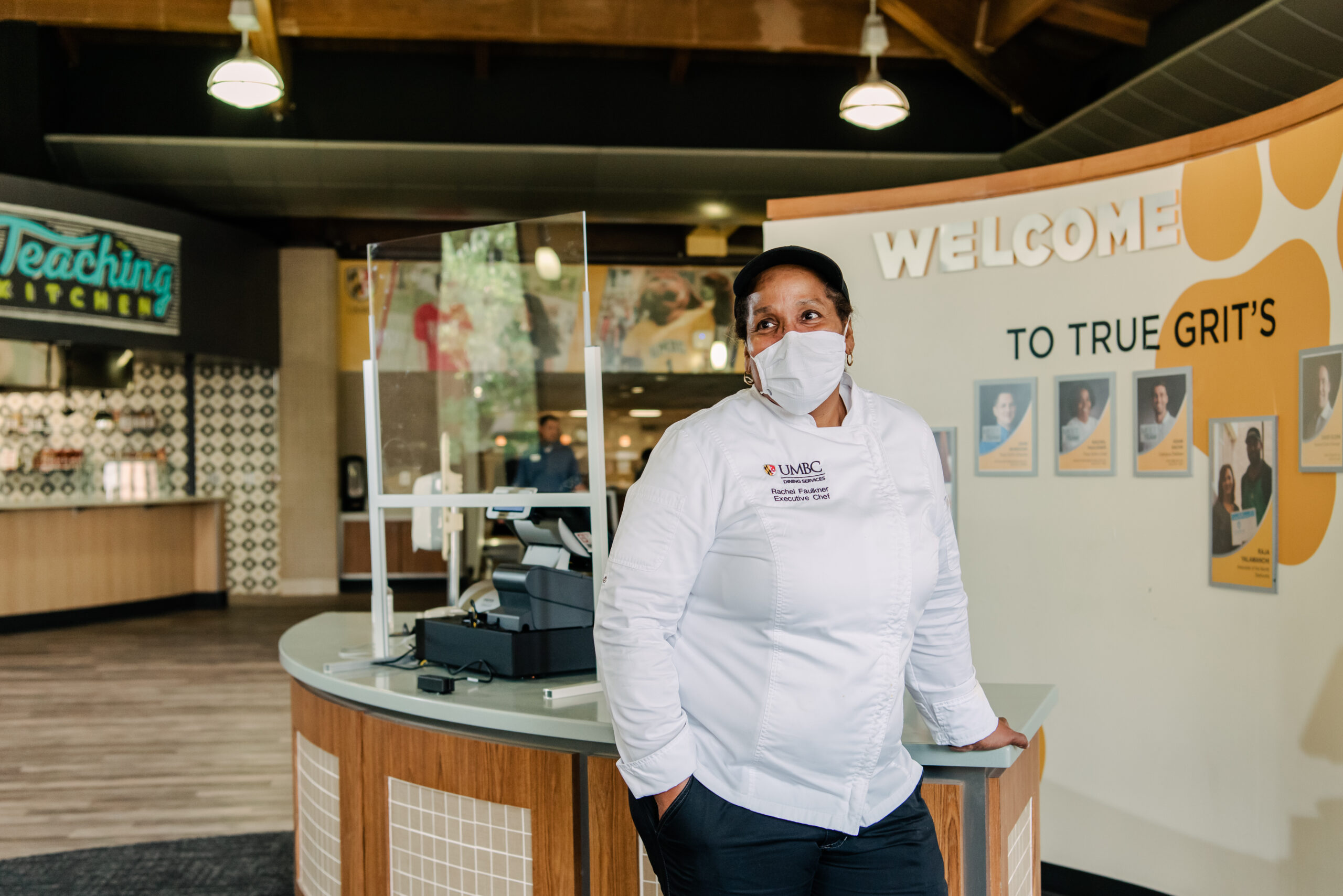
During this time, Faulkner says her job felt more intense and hectic because she was constantly adapting to new needs or requirements. Overnight, she and her team began offering to-go boxes, and the dining staff started serving food to people to reduce the number of hands touching utensils self serve involved. She also had to make sure that her staff was following the ever-changing health and safety guidelines, which made the job overwhelming at times. “We hardly saw anybody,” Faulkner says about what she saw looking out the windows of True Grit’s. “There were people who were afraid to come into the dining hall to eat. They said they’d rather order out.”
Faulkner, who has worked at UMBC for 23 years and for Chartwells since 2008, says that her primary job responsibilities largely stayed the same throughout the pandemic, except she had to step in to fill in roles that were empty due to a limited staff. It was an all-hands-on-deck situation, Faulkner recalls. At one point, she even worked the register.
Looking back, she says that she could not have done her job without her teammates, including John Burgoon ’99, psychology, director of resident dining at UMBC. “The whole team made sure students were fed, and that we had the tools we needed to get through the day,” Faulkner says. “I couldn’t have done it alone. I needed my team.”
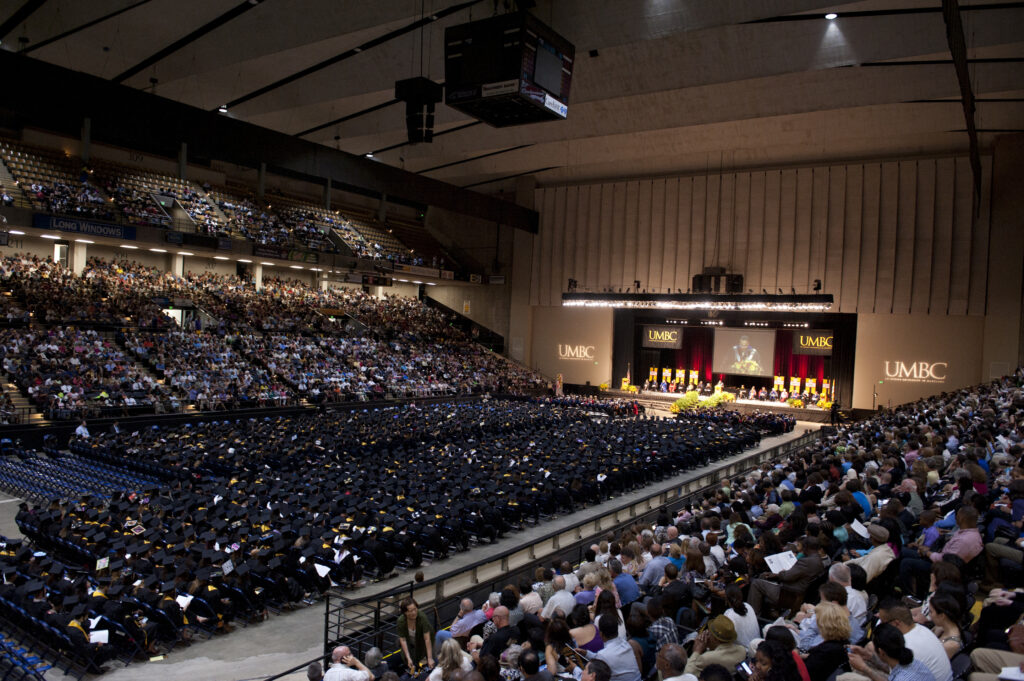
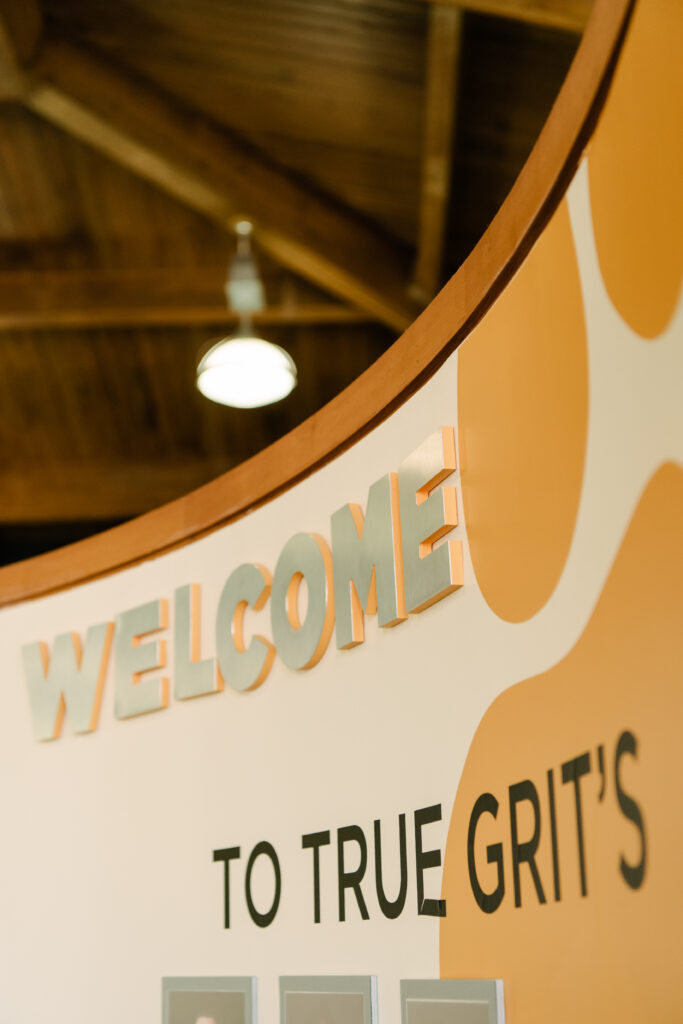
True Grit’s is now open for dining, and Faulkner is excited to welcome students back. “I am excited to see all the new faces,” she says. “I’m hoping that things are somewhat back to normal. I hope we have a big turnout at the dining hall and people feel safe coming to eat here.”
– Megan Hanks Mastrola
Creating Future-Forward Classrooms
Name: Victor Adebanjo ’23
Title: Student AV Installation Worker
Location: Math and Psych
In January 2021, Victor Adebanjo ’23, mechanical engineering, gratefully found himself back on campus, helping to ready classrooms for the eventual return of more students. As a student worker in the Department of Instructional Technology (DoIT), Adebanjo was tasked with helping usher UMBC’s learning spaces into the future.
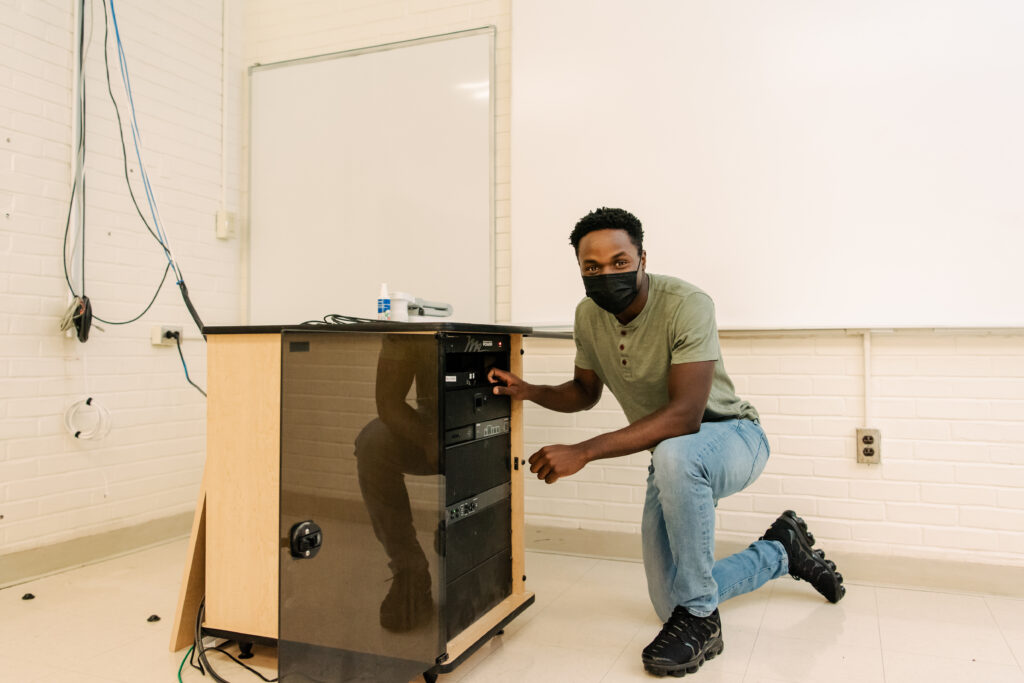
On campus, there were a million things to do and not enough hands—far from when the pandemic first hit, and Adebanjo wasn’t even sure he had a job.
In March 2020, Adebanjo didn’t have time to process when his boss said he could no longer come into work. His school work was the first thing he had to deal with and keeping up with the academic changes was more than enough of a fulltime job.
After making it through that spring semester, Adebanjo asked David Souder, coordinator of AV services in DoIT, if there was any work and was immediately put on a rotation of Webex meetings so he could virtually assist professors with their classes. After that, he assisted with transitioning the Meyerhoff Summer Bridge program to a virtual environment.
Then came the call to return to campus to modify learning spaces. Part of this included arranging high flex spaces—classrooms with cameras and microphones so that a student attending the class can virtually see the classroom and the professor, and vice versa.
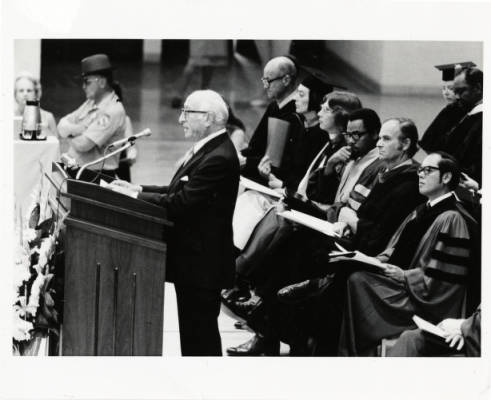
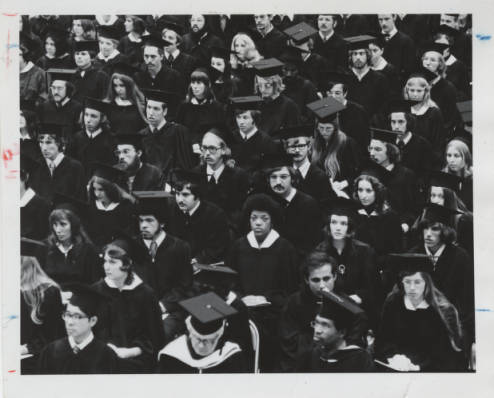
While it was rough to adhere to the strict COVID-19 regulations and endure the eerie quiet of campus, says Adebanjo, he and his coworkers found a way to make it bearable. As they worked in empty buildings, they’d talk about the ghosts in the halls and the walls. One day, while walking in the dim halls of Math/Psych, Adebanjo says, “as I came down the hall, the door was shaking… since it’s so quiet you can just hear everything.”
Adebanjo would like his fellow returning students to know that a lot of collaboration and hard work has been invested to make sure campus is the way everyone remembers it. “Everything is still here for you when you return,” he shares.
— Charis Lawson ’20
Getting Student-Athletes to the Finish Line
Name: Stacy Carone
Title: Associate Athletic Director for Sports Medicine and Performance, UMBC Athletics
Location: Chesapeake Employers Insurance Arena
Stacy Carone still gets goosebumps when she thinks back to that day.
“March 12, 2020, is the day that college athletics stopped,” says Carone, associate athletic director for sports medicine and performance, who prior to that day spent her campus hours helping student-athletes succeed in their sports.
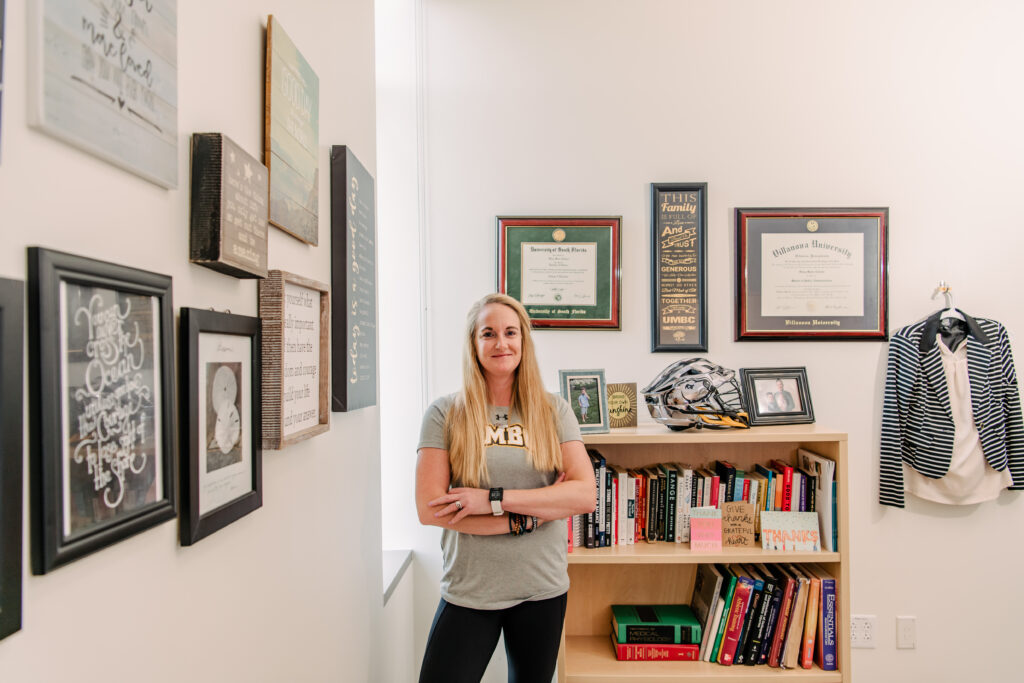
“Even then, we couldn’t have predicted the magnitude of the pandemic in any way. What it was going to do to the world or what it was going to do to our mental wellness or physical wellness. I am not exaggerating that our work in sports performance and sports medicine to safely return the student athletes to campus happened on March 13, 2020.”
As she retells it now, sitting in her office right off the arena’s sports medicine facility, Carone quickly realized that the work that her team does to closely monitor the wellbeing of UMBC’s almost 400 student-athletes had to pivot to work during the pandemic—a time when although games and practices were cancelled, student-athletes still checked in with their teammates, coaches, athletic trainers, and training continued on with adjustments made due to students being in different places. UMBC Athletics launched virtual monitoring that focused on athletes’ mental health and coping during the pandemic. “It gave us that open door to check in like we would every day,” she explains.
Eventually the virtual would turn to in-person again. Carone and the sports medicine and sports performance team returned to campus in July 2020 to accompany her athletes as they navigated policies from UMBC and America East Conference in order to compete in an unusual Fall 2020 season. Since the pandemic began, Carone and her colleagues developed a 200-page document that outlined everything from cleaning practices to testing requirements and occupancy limitations. Carone also managed COVID-19 testing for student-athletes—she says that when most people were still at home wiping down their mail, her team was in the office, dressed in multiple layers of PPE to test student-athletes.
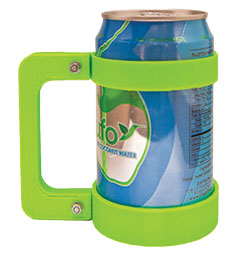
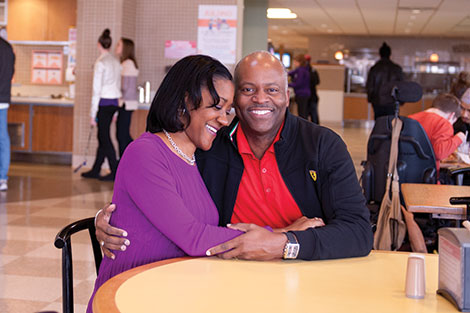
“We do what we do because we like interacting with our student athletes,” says Carone. “We do this for the gift of playing a role in a student athlete’s life. Everything we do, we approach as a team. So we were just happy to be back. It felt different. It looked different. But we’re back.”
– Megan Hanks Mastrola
Maintenance Continues Above Ground and Below
Name: John Zahor
Title: Director of Operations and Maintenance
Location: Campus tunnel system
Name: Craig Goodwin
Title: Director of Design and Construction
Location: Campus tunnel system
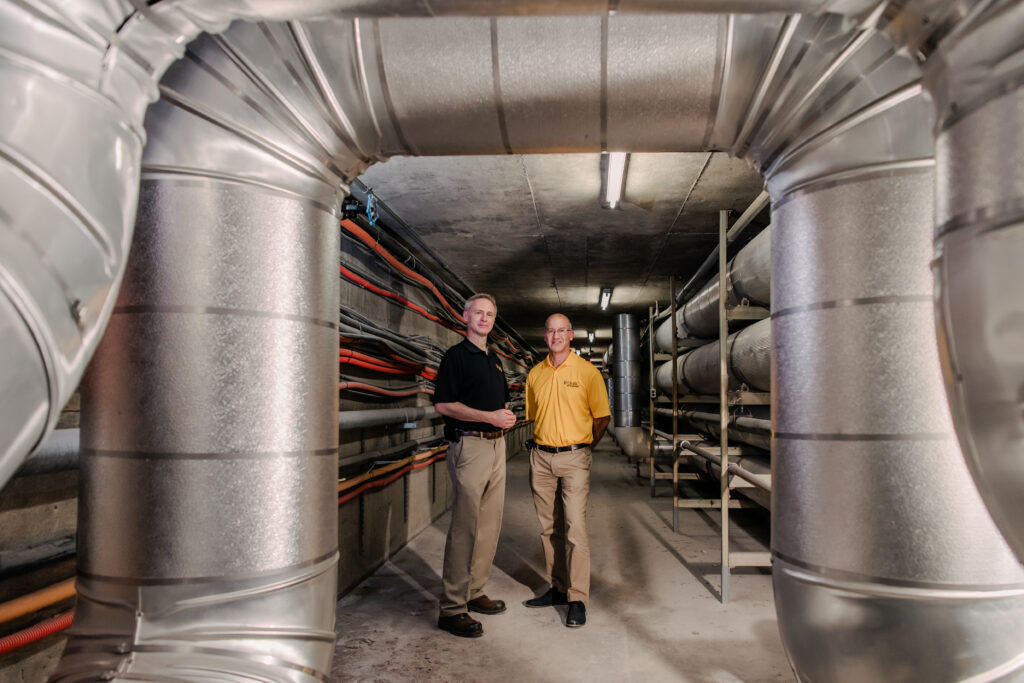
The campus tunnel system may be the basis for Retriever lore, but in reality the underground structures are so much more important. Meet two of the people who help keep the fresh air circulating throughout each classroom and office as they navigate the underground paths with intimate knowledge of their history and function: John Zahor—director of operations and maintenance, who oversees the plumbing, electrical, painting, and architecture shops at UMBC—and Craig Goodwin, director of design and construction.
Not all offices had the option for remote work, and Facilities Management kept up their important tasks of maintaining the buildings, construction, grounds, and related operations while so many community members were absent.
Zahor realized that his first big challenge was to figure out a schedule for his staff to follow that allowed them to complete projects while abiding by social distancing and campus guidelines. The Facilities Management team regularly checked on buildings, oversaw construction, and responded to any issues that arose including water leaks and dripping faucets. Zahor’s team usually receives many work orders from people across UMBC when folks are on campus. This often helps determine their projects, but with fewer people on campus during the pandemic, his team relied on stepped up surveys and their observations to guide their work.
“Without many people on campus, we have less service requests and less eyes seeing what is going on,” he explains, noting that typically there are 14,000 people on campus who see things before they do. “We had to do a lot of surveys and get people walking around, asking them to tell us what they saw.”
The distribution of resources also shifted during the pandemic as campus needs changed, explains Zahor. With fewer people on campus each day to maintain the grounds. Facilities Management scaled back its planting, opting for plants that required less maintenance, he says.
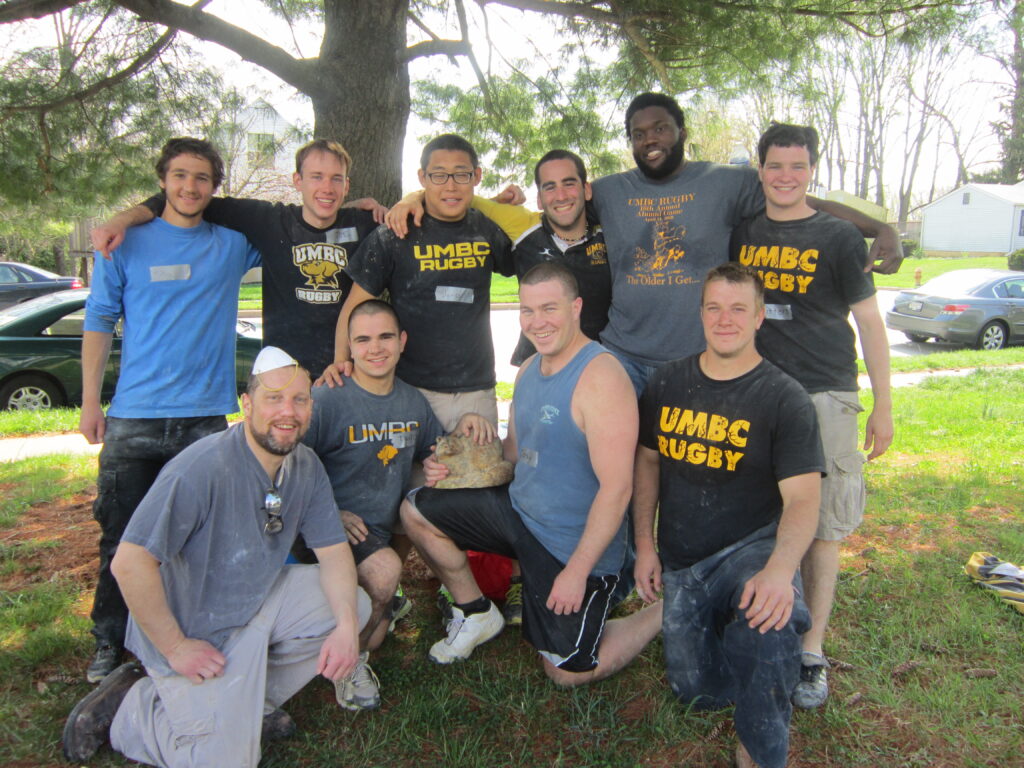

Eventually, Zahor developed a schedule where each member of his team would come to campus two or three days each week, so that projects could be continued while maintaining social distancing. That schedule stayed in place until the end of June 2021, when Zahor’s team returned to campus five days a week.
Goodwin’s team works with Zahor’s team to manage on-campus construction projects that are underway at UMBC, including the work being done outside Sherman Hall and the construction of the new Center for Wellbeing. For these projects, Goodwin sees a silver lining to an otherwise undesirable situation—with fewer people on campus during COVID, fewer people were inconvenienced by these large-scale projects.
Despite the upside of completing projects more efficiently, Goodwin says he missed seeing the folks who call these buildings home. “This place is a community. Not having students, faculty, and staff here was sad. I really missed that, and I’m really looking forward to seeing people.”
– Megan Hanks Mastrola
Educating the Youngest Retrievers
Name: Michelle Gross
Title: Director
Location: Y Preschool at UMBC
Name: Myeisha Jones
Title: Preschool instructor, 2 year olds
Location: Y Preschool at UMBC
When the Y Preschool at UMBC reopened just days after the March 12 shutdown of campus, Myeisha Jones knew she had to be there. Jones is one of the longest-serving instructors at the preschools—in charge of the 2-year-olds—and she knew a familiar face, even just her eyes above a mask, would be a welcome sight. “When they sent the email to see who might be willing to come back,” says Jones, “I wanted to help. I didn’t want to leave the kids out and not help the parents who had to go back to work.”
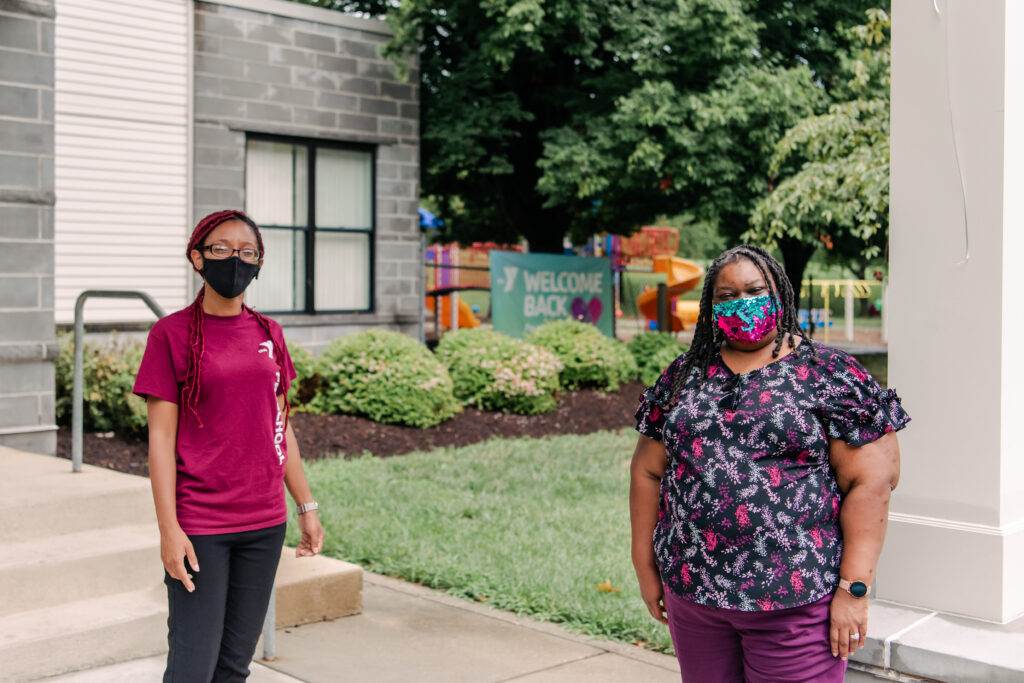
The preschool, nestled between Harbor Hall and Hillside Apartments, is usually home to 64 kids, ages 2 to 5. When so much of campus closed, Jones and others fielded phone calls from anxious parents, who understandably had a lot of questions about new COVID-19 protocols. Michelle Gross, who was hired as the director of the preschool in June 2021, says that childcare facilities are actually uniquely prepared for moments like the pandemic. “We have the proper training for different things like asthma or allergies and we already had strict cleaning and handwashing protocols. So we had a good head start for implementing new strategies, checking temperatures, and increasing sanitization.”
When the preschool reopened, they had about 20 kids show up, and were able to operate with reduced class sizes to abide by new space regulations. Jones says that they built health protection measures into their activities, singing songs about washing your hands or games about how to wear your mask correctly. But for the most part, she and Gross agree, the kids adapted quickly to the new way of life, even occasionally reminding teachers to pull up a slipping mask.
Jones says the hardest part of working on a mostly closed campus was not being able to walk the kids around to different destinations, like the library, or getting to stop by Starbucks on her break. But the parents really showed up, she emphasizes, even the ones who kept their kids at home. “They would call and text and check in on us, send supplies, even have lunch delivered sometimes,” Jones says. “Because even though they’re not here, they know I’m here.”
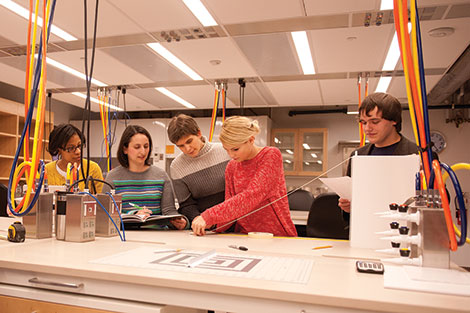
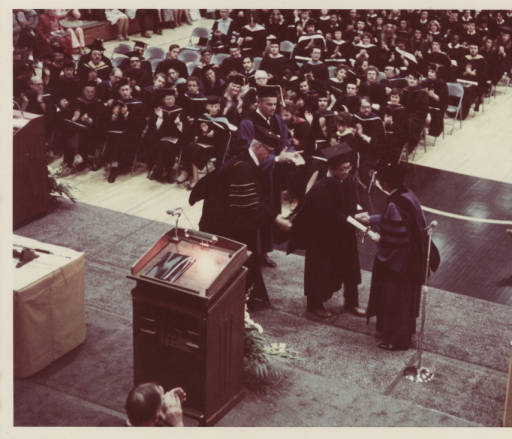
Gross wants parents to know that the preschool is ready for their kids to return in full capacity. “We’re doing our best here to make sure all of the kids can stay safe, get educated, and be ready for kindergarten,” says Gross. “So that is our ultimate goal and it’s never changed. I want them to know that it’s safe and that we’re ready. We miss not having a full building of kids.”
— Randianne Leyshon ’09
Patrolling the Silence
Name: Bruce Perry ’97
Title: Deputy Chief of Police
Location: UMBC Police Station
Bruce Perry ’97, psychology, has spent his life preparing for the range of situations that might arise due to being a police officer. But he hadn’t prepared for the silence on campus for the past 18 months.
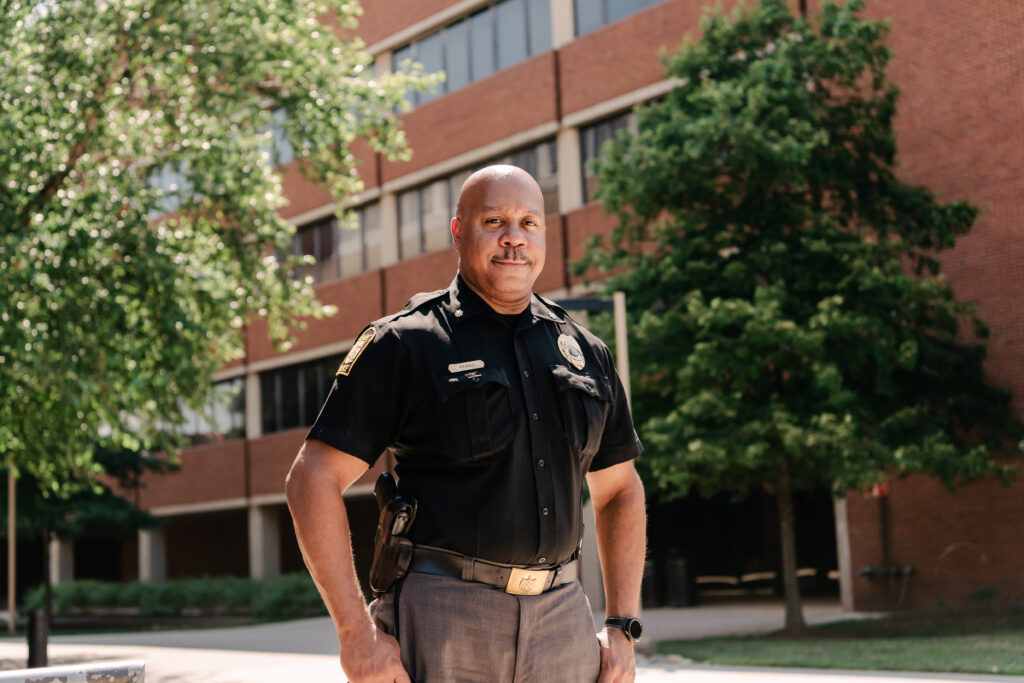
Since high school, Perry trained for this career by taking practicals, directing traffic, and enrolling in law enforcement classes as a police explorer in his young adult years. While attending UMBC, he worked as a police aide, where he confirmed his aspirations. After graduating, Perry worked his way up through the ranks of UMBC’s Police, from patrolling campus to overseeing all operations and support services. During the pandemic, the police station continued its 24/7 operations, so Perry jumped into the rotation of officers.
“It was so weird,” says Perry, who continued to work on campus the past year and a half. “Since I’ve been here for so long I have never seen campus so bare or empty.”
But while the pandemic made most of campus quiet, Perry had to deal with a roster of new concerns. Approved visitors had to follow protocols to get into locked buildings—which included contacting the police to request permission—and alarms went off in other buildings when people tried to access them. These day-to-day tasks replaced most of his customary activities.
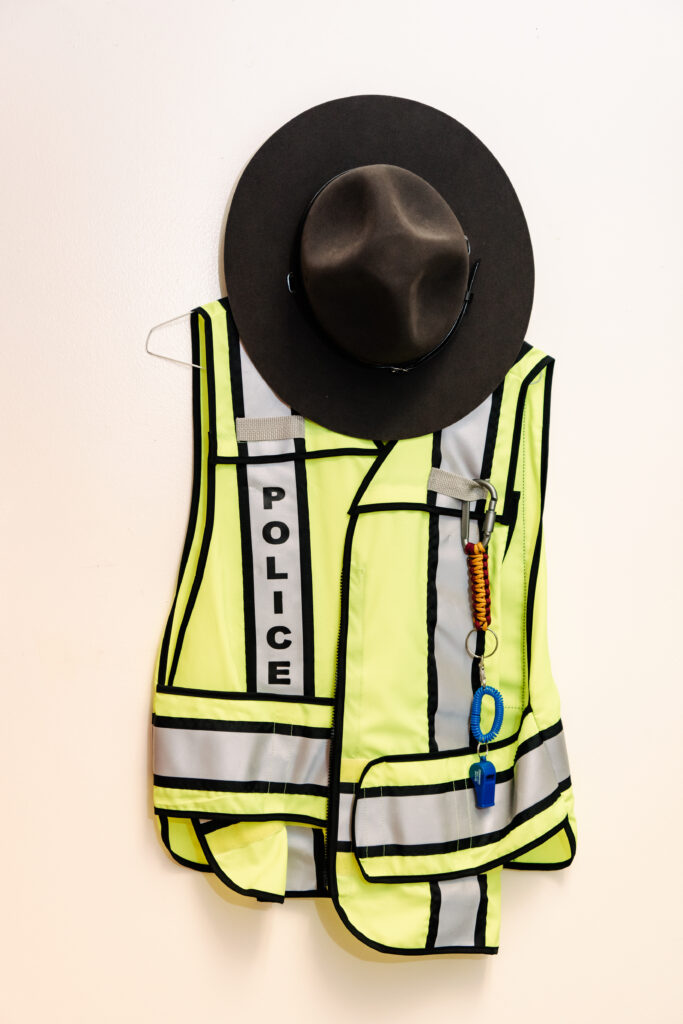
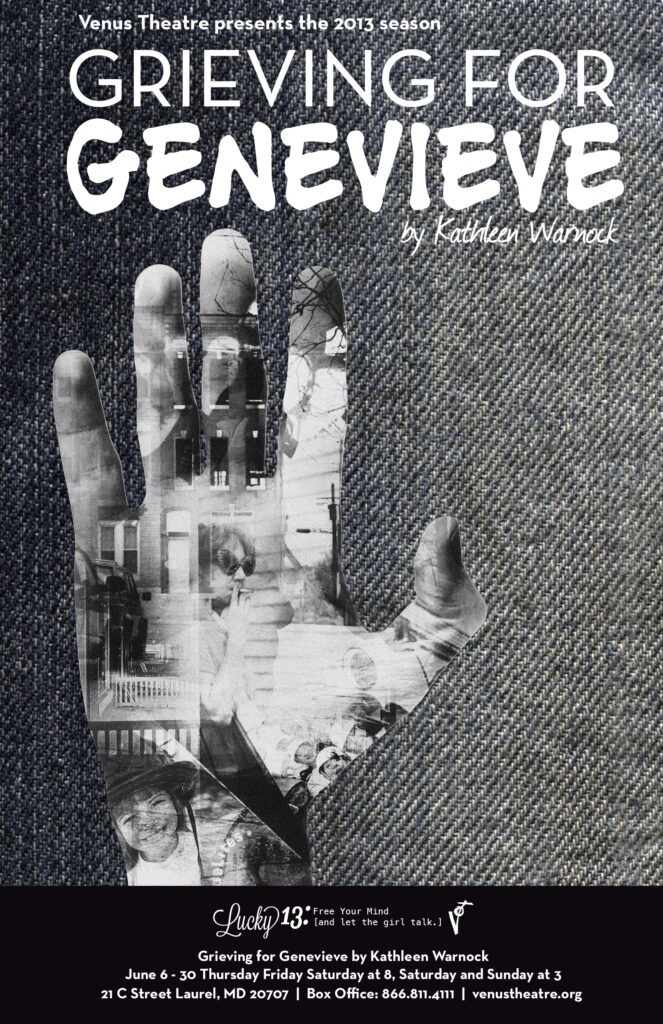
Most of his job is administrative now, says Perry, so some things didn’t change, like monitoring what was happening around campus and holding his regular meetings, even if they were now virtual. Since there were fewer incidents, Perry volunteered for campus committees that dealt with the university’s response to the pandemic.
Perry feels like the pandemic has taught him an important lesson. ”If we are given direction from those who know what they are talking about… we can all make it through this,” he commented, excited for life to return to campus. “I’m so happy that things are going back to normal, or somewhat normal. We came out of a trying time.”
— Charis Lawson ’20
Coffee and Art to Support the Community
Name: Deep Patel ’19
Title: Co-founder of OCA Mocha
Location: OCA Mocha
Name: Michael Berardi ’19
Title: Co-founder and General manager of OCA Mocha
Location: OCA Mocha
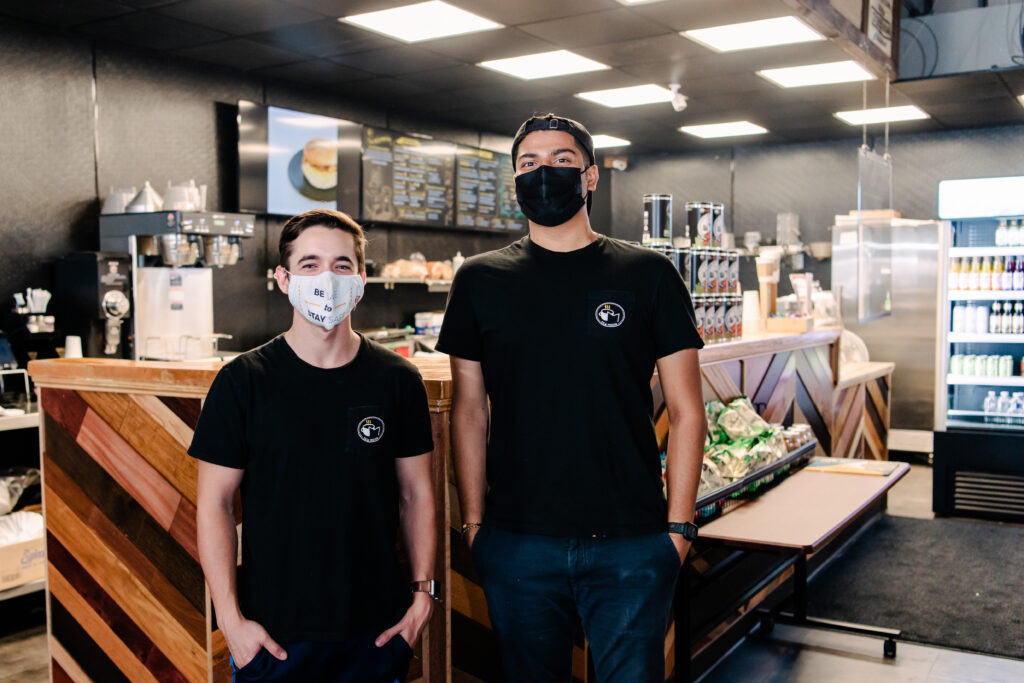
When OCA Mocha, a UMBC-affiliated coffee shop and community gathering space in downtown Arbutus, opened its doors in 2019, co-founders Deep Patel ’19 and Michael Berardi ’19 could never have imagined how much a global pandemic would drastically change the way they ran their business. Before COVID-19, the pair worked to bring people into the space, not only for coffee but to connect with members of the community through events. When the pandemic began, Patel, biological sciences and financial economics, says they had to make a sharp pivot. OCA Mocha shut down from March 2020 to June 2020. “Public safety always came first,” Patel explains.
To keep their dream of a coffee shop viable, Patel and Berardi quickly developed a system for online ordering and curbside pickup. To stay true to their mission of serving the Arbutus community, the shops began giving out free meals and activity kits to children in Arbutus, and Patel and Berardi drove around town to make the deliveries. “It was born out of a need in the community,” says Berardi, media and communication studies.
Prior to COVID, the OCA Mocha team had started a kids club that allowed children in the community to come to the coffee shop and work on crafts, so they came up with a pick-up option. “It was essentially a condensed summer camp,” Berardi explains, adding that in collaboration with UMBC student orgs and local activists, OCA Mocha also hosted virtual events to talk about topics including social and racial issues.
Patel says that one of the good things that came from the pandemic was spending a lot of time getting to know Berardi better, noting that oftentimes they were the only staff members at OCA Mocha. Throughout COVID, the OCA Mocha team received regular support from Mike Pound, director of environmental safety and health at UMBC, Gib Mason ’95, economics, professor of practice in entrepreneurship, as well as Office of Institutional Advancement staff, and the OCA Mocha management committee, who made themselves available at any point to provide guidance.
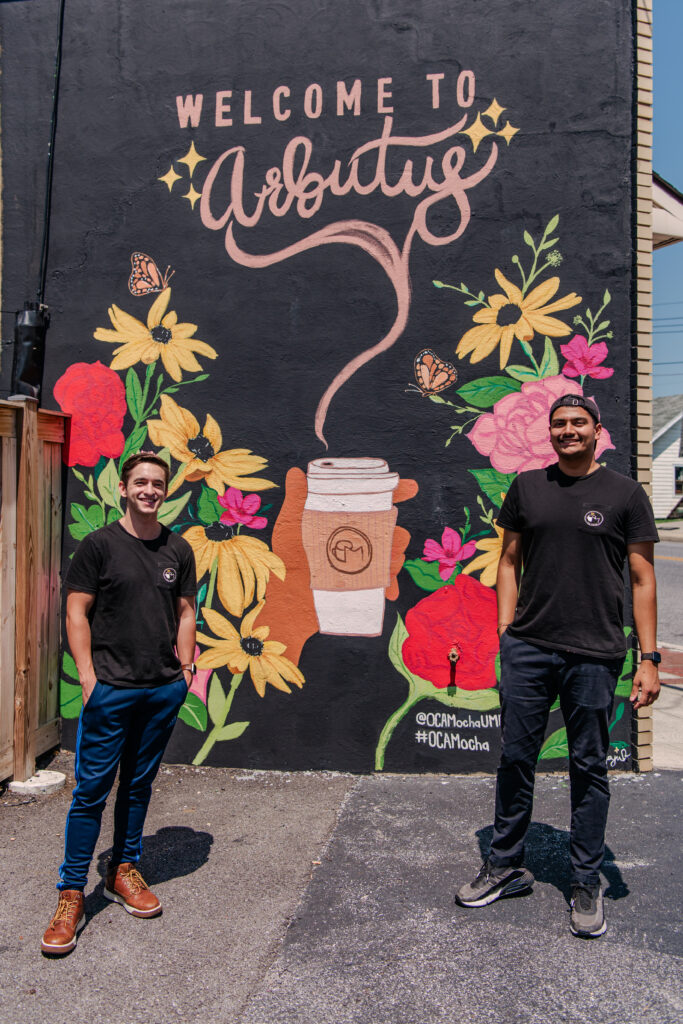
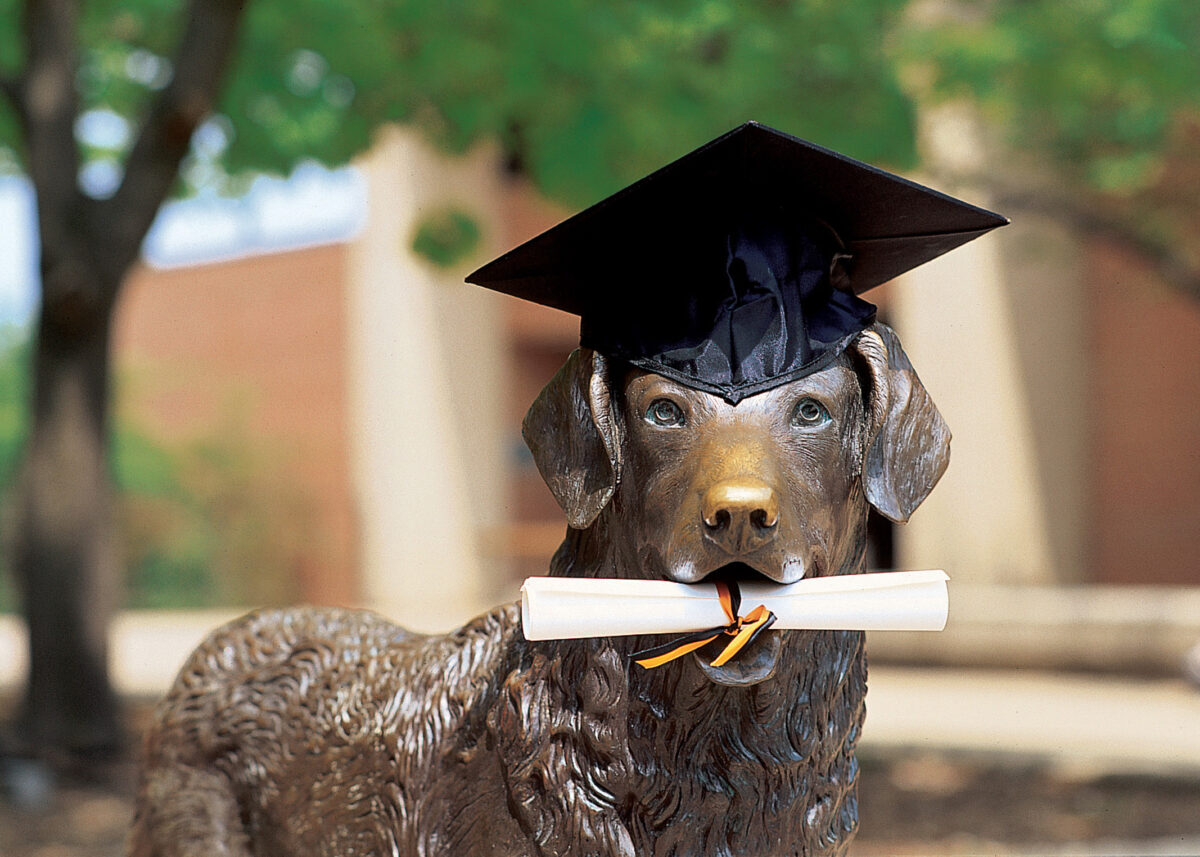
“I think we learned a lot of valuable lessons,” says Berardi. “It’s important to take a step back and focus on what really matters. I personally learned the power of community to lift each other up and get through challenging times together.”
– Megan Hanks Mastrola
*****
All photos by Marlayna Demond ’11.
Tags: campus life, photo essay, UMBCTogether

